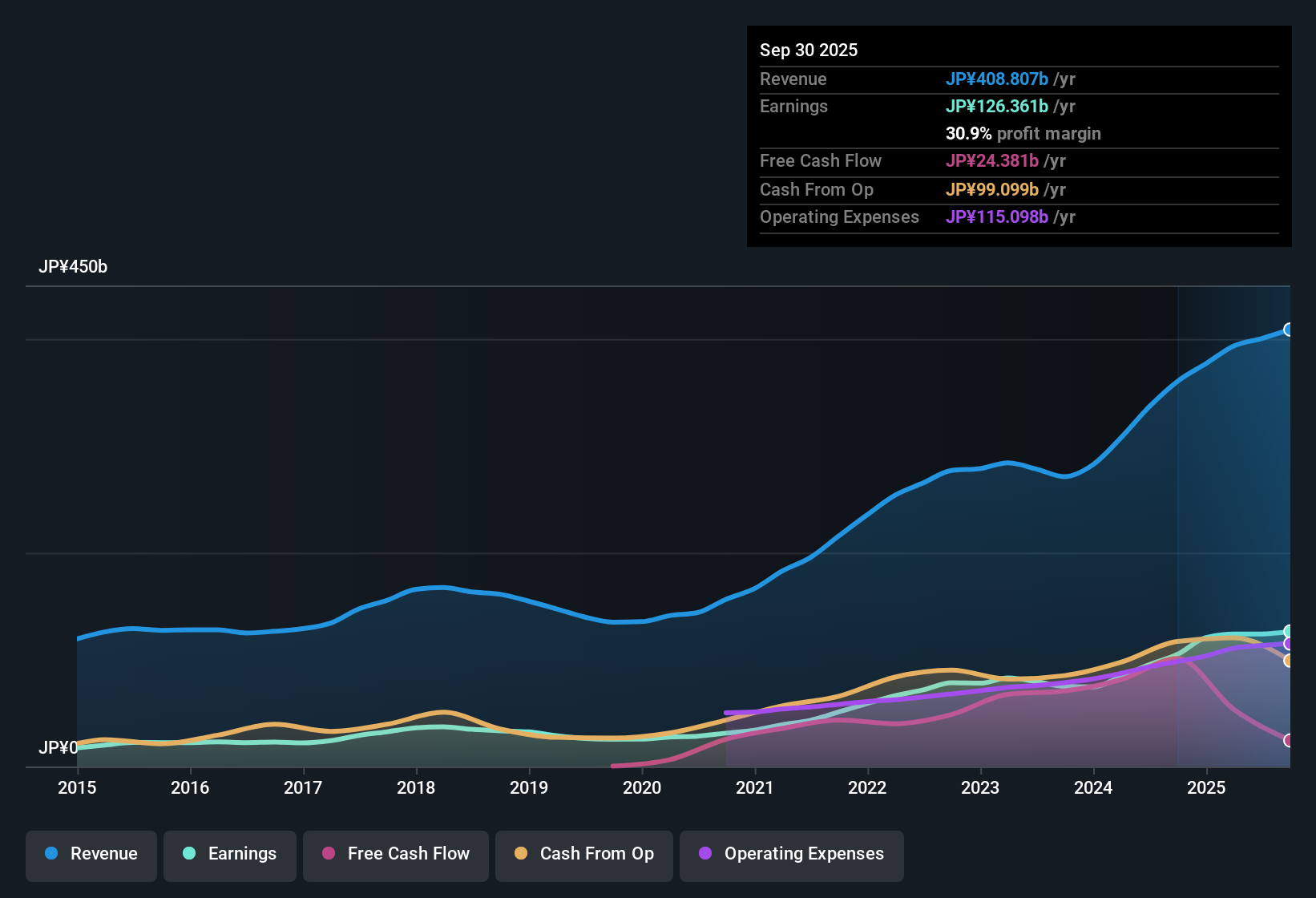- Japan
- /
- Semiconductors
- /
- TSE:6146
There May Be Underlying Issues With The Quality Of Disco's (TSE:6146) Earnings
Despite announcing strong earnings, Disco Corporation's (TSE:6146) stock was sluggish. We did some digging and found some worrying underlying problems.

Zooming In On Disco's Earnings
In high finance, the key ratio used to measure how well a company converts reported profits into free cash flow (FCF) is the accrual ratio (from cashflow). In plain english, this ratio subtracts FCF from net profit, and divides that number by the company's average operating assets over that period. This ratio tells us how much of a company's profit is not backed by free cashflow.
As a result, a negative accrual ratio is a positive for the company, and a positive accrual ratio is a negative. While it's not a problem to have a positive accrual ratio, indicating a certain level of non-cash profits, a high accrual ratio is arguably a bad thing, because it indicates paper profits are not matched by cash flow. Notably, there is some academic evidence that suggests that a high accrual ratio is a bad sign for near-term profits, generally speaking.
For the year to September 2025, Disco had an accrual ratio of 0.42. That means it didn't generate anywhere near enough free cash flow to match its profit. As a general rule, that bodes poorly for future profitability. In fact, it had free cash flow of JP¥24b in the last year, which was a lot less than its statutory profit of JP¥126.4b. Disco shareholders will no doubt be hoping that its free cash flow bounces back next year, since it was down over the last twelve months.
That might leave you wondering what analysts are forecasting in terms of future profitability. Luckily, you can click here to see an interactive graph depicting future profitability, based on their estimates.
Our Take On Disco's Profit Performance
As we discussed above, we think Disco's earnings were not supported by free cash flow, which might concern some investors. As a result, we think it may well be the case that Disco's underlying earnings power is lower than its statutory profit. Nonetheless, it's still worth noting that its earnings per share have grown at 61% over the last three years. Of course, we've only just scratched the surface when it comes to analysing its earnings; one could also consider margins, forecast growth, and return on investment, among other factors. If you'd like to know more about Disco as a business, it's important to be aware of any risks it's facing. You'd be interested to know, that we found 2 warning signs for Disco and you'll want to know about them.
Today we've zoomed in on a single data point to better understand the nature of Disco's profit. But there are plenty of other ways to inform your opinion of a company. For example, many people consider a high return on equity as an indication of favorable business economics, while others like to 'follow the money' and search out stocks that insiders are buying. While it might take a little research on your behalf, you may find this free collection of companies boasting high return on equity, or this list of stocks with significant insider holdings to be useful.
New: Manage All Your Stock Portfolios in One Place
We've created the ultimate portfolio companion for stock investors, and it's free.
• Connect an unlimited number of Portfolios and see your total in one currency
• Be alerted to new Warning Signs or Risks via email or mobile
• Track the Fair Value of your stocks
Have feedback on this article? Concerned about the content? Get in touch with us directly. Alternatively, email editorial-team (at) simplywallst.com.
This article by Simply Wall St is general in nature. We provide commentary based on historical data and analyst forecasts only using an unbiased methodology and our articles are not intended to be financial advice. It does not constitute a recommendation to buy or sell any stock, and does not take account of your objectives, or your financial situation. We aim to bring you long-term focused analysis driven by fundamental data. Note that our analysis may not factor in the latest price-sensitive company announcements or qualitative material. Simply Wall St has no position in any stocks mentioned.
About TSE:6146
Disco
Manufactures and sells precision cutting, grinding, and polishing machines in Japan and internationally.
Flawless balance sheet with reasonable growth potential.
Similar Companies
Market Insights
Community Narratives



